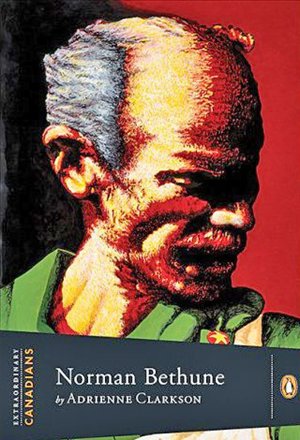Extraordinary Canadians:
Norman Bethune

Support Canada's History in other ways (more)
by Adrienne Clarkson
Penguin Canada, Toronto, 2009
204 pp., $26 hardcover
What would motivate a man like Norman Bethune to leave a successful medical practice in Canada to work in war zones thousands of miles away under extremely difficult conditions, with inadequate supplies and accommodation? Why would he describe his final twenty months in China as the most significant and meaningful of his life? And why is he acclaimed the single most famous Canadian in the world? These questions make Bethune an ideal subject for the Extraordinary Canadians series, and Adrienne Clarkson’s background and journalistic experience make her a fitting choice as author.
As the son of a Presbyterian minister, Bethune shared the church’s concern for the poor. He worked with Frontier College teaching his fellow labourers to read and write at night. When the First World War broke out, he volunteered to serve as a stretcher-bearer. Later, working as a surgeon in Detroit, he did more than his share of looking after poor patients, and when he returned to Canada he championed the idea of a state-supported medical system long before it gained popularity.
Bethune was also tempted by fine objects. He liked expensive suits and spent lavishly on art. He married a wealthy woman after the war and spent six months spending her inheritance on luxurious travel and living in Europe. His life as a successful, well-paid surgeon should have afforded him much satisfaction, but something was missing.
Clarkson shows how Bethune eventually came to resolve these conflicting influences of materialism and compassion for others. In 1926 he developed a severe case of tuberculosis and entered a sanitarium, where a radical new procedure — pneumothorax, which artificially collapses a diseased lung — likely saved his life. The prolonged period of illness gave him time to reflect on what he really wanted to do. The other transforming event was the Depression, when many people could not afford proper medical treatment. Bethune visited the USSR and was impressed by the medical system and the efforts to spread state wealth among the people. In 1935 he joined the Communist Party.
Bethune now devoted his life even more completely to the service of others. He raised funds in Canada for the democratically elected Republican Party in Spain and set up a system of mobile blood transfusion units that would save many lives during the Spanish Civil War. The next year he was off to China to help the Eighth Route Army as it sought to repel a Japanese invasion. Clarkson quotes his assistant, Canadian nurse Jean Ewen, who described the historic meeting between Bethune and Mao Zedong in March 1938. A year and a half later, Bethune cut himself during an operation and died of blood poisoning.
During her research for the book, Clarkson went to China. She visited the Bethune Museum and the room where Bethune and Mao met, and she fell under the spell of the powerful propaganda Mao created around Bethune’s efforts. Mao’s eulogy, memorized by schoolchildren for decades and quoted in Clarkson’s first chapter, helps to explain why the Chinese consider Bethune a national hero. Throughout the book she quotes at length from Bethune himself and from a number of other sources, including Hugh MacLennan’s novel Watch that Ends the Night, whose protagonist closely resembles Bethune.
Bethune was a complex character and Clarkson is careful to bring out both his virtues and his flaws. Like Louis Riel, he is a Canadian whose life ended tragically and who has become a mythic figure in our history. Clarkson does an excellent job of documenting the tensions in Bethune’s life and conveys her information with a journalist’s eye for detail. Her book is a worthy addition to the Extraordinary Canadians series.
— Charles Hou (Read bio)
Is a retired educator who served on the board of directors of Canada’s History society for several years and is active in the British Columbia Historical Federation and the Vancouver Historical Society.